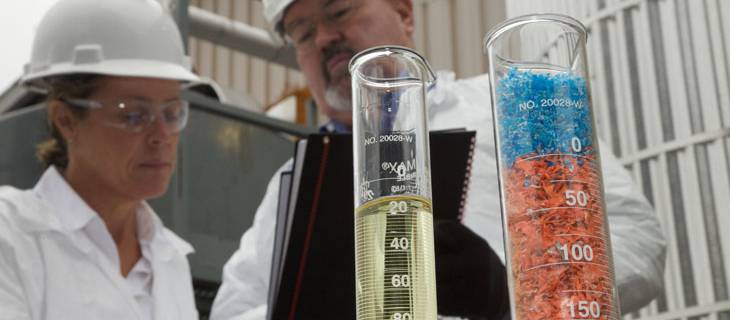How Plastic Waste is Converted to Crude Oil & Sulphur
Plastics have always delivered multiple benefits that contribute to the betterment of modern life. They save fuel by reducing the weight of our cars, they help us save energy by insulating our homes, keep medical supplies sterile and help to package and preserve the freshness of our food.
With the countless benefits that plastics offer, there is a rising challenge when it comes to disposing and recycling them. However, with the developments of technology and innovations, we have discovered ways to harness fuel such as crude oil and sulfur from non-recycled plastics. Let’s look at two projects that are focused on converting plastic waste to fuels such as crude oil and sulphur.
Researchers from Illinois Sustainable Technology Center B.K. Sharma and Kishore Rajagopalan, in collaboration with the US Department of Agriculture, have come up with a recycling method in which plastic waste is converted into fuel. High-density polyethylene bags sourced from local retailers were used by the team. The plastic bags were fed into a pyrolysis unit thereby creating crude oil in the process. The team then distilled the crude oil to make diesel and gasoline. The result of the research was a fuel that was superior to conventional diesel fuels in terms of cetane numbers and lubricity.
A team of researchers from a US firm called Plastic2POil has come up with a method to convert plastic waste into sulphur fuel. The team used discarded plastic waste as a feedstock to produce ultra-low sulphur diesel that contains low traces of sulphur content. Ultra-low sulphur diesel is usually created from petroleum, however, the processor manufactured by the team from Plastic2POil generates plastic-derived fuel without the need for petroleum. Unsorted plastic is fed to the processor and one gallon of sulphur fuel is generated from 8.3 pounds of material. What’s more, the fuel produced can also be refined and separated without the need for a distillation tower.
With such incredible innovations and great minds working towards converting plastic waste to fuel, it makes us wonder what could be next?
Leave a Reply Cancel reply
Recent Posts
- Understanding The Materials That Are Used To Build Plastic Toys
- All You Need To Know About Food-grade Plastics
- A Glance At The Materials That Boost The Performance Of Plastics
- Understanding The Importance Of Exploring New Business Opportunities In The Plastic Industry
- Understanding The Importance Of Investing in R&D For The Plastic Industry
Categories
- 3D Printing
- AIPMA
- Automation
- Automobile Sector
- Bio Plastics
- Environment
- Innovations In Recycling
- Latest Innovations
- Molds & Dies
- News
- Packaging Industry
- Plastic
- Plastic Application
- Plastic Industry
- Plastic Market
- Plastic Myths
- Plastic News From The World
- Plastic Packaging
- Plastic Products
- Plastic Recycling
- Plastic Solar Cells
- Plastic Toys
- Plastic Waste
- Plastic World
- Plastics
- Plastics And Their Applications
- Plastics In Agriculture
- Plastics In Healthcare
- Plastics In Medical Industry
- Plasticulture
- Processing Machinery
- Recycling Machines
- Robotics
- Uncategorized
- Virtual Reality
Archives
- November 2023 (3)
- October 2023 (2)
- September 2023 (3)
- August 2023 (3)
- July 2023 (3)
- June 2023 (3)
- May 2023 (2)
- April 2023 (2)
- March 2023 (2)
- February 2023 (2)
- January 2023 (2)
- December 2022 (3)
- November 2022 (1)
- October 2022 (1)
- September 2022 (2)
- August 2022 (1)
- July 2022 (3)
- May 2022 (3)
- March 2022 (2)
- February 2022 (1)
- January 2022 (1)
- September 2021 (2)
- August 2021 (3)
- July 2021 (4)
- June 2021 (4)
- May 2021 (3)
- April 2021 (2)
- March 2021 (4)
- November 2019 (8)
- October 2019 (8)
- September 2019 (8)
- August 2019 (8)
- July 2019 (8)
- June 2019 (8)
- May 2019 (8)
- April 2019 (8)
- March 2019 (8)
- February 2019 (11)
- January 2019 (8)
- December 2018 (8)
- November 2018 (12)
- October 2018 (12)

